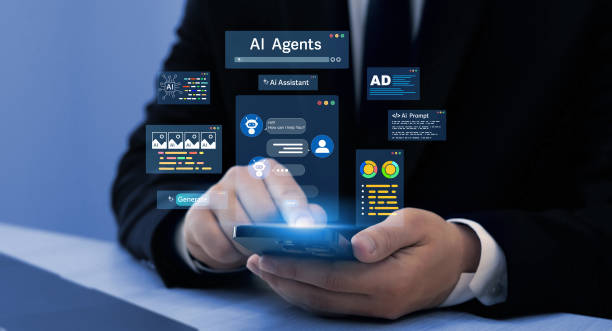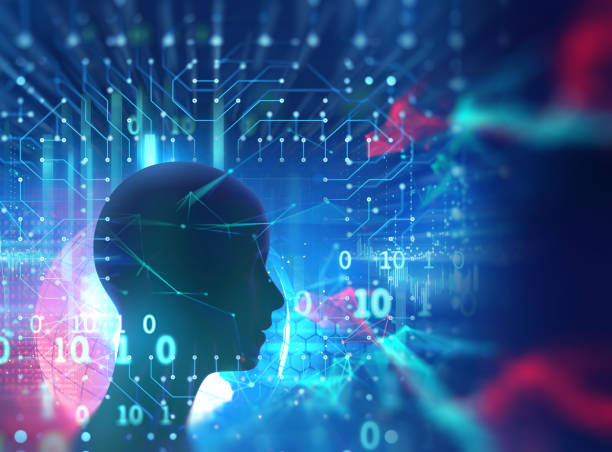What is Artificial Intelligence? Definition, History, and Key Concepts

#Artificial_Intelligence (AI) is a branch of computer science that seeks to create machines capable of performing tasks that typically require human intelligence.
These tasks include learning, reasoning, problem-solving, understanding natural language, and recognizing patterns.
Since its inception in the 1950s, Artificial Intelligence has grown significantly and has become an integral part of our daily lives.
From recommender systems on Netflix and Amazon to self-driving cars and voice assistants, AI is changing the world.
Key concepts in AI include Machine Learning, Deep Learning, neural networks, and Natural Language Processing (NLP).
These concepts enable machines to learn from data, recognize patterns, and communicate with humans in natural language.
Are you tired of your company’s website not meeting your expectations? With Rasawb, design a professional website that truly represents your business.
✅ Increase acquisition of new customers and sales leads
✅ Enhance your brand’s credibility and trust among your audience
⚡ Get a free website design consultation!
Types of Artificial Intelligence: Approaches and Applications

Artificial intelligence can be categorized based on various capabilities and approaches.
In terms of capability, AI can be divided into two general categories: Narrow AI and General AI.
Narrow AI is designed to perform a specific task, such as facial recognition or language translation.
In contrast, General AI is capable of performing any task that a human can.
In terms of approach, AI can be divided into two general categories: Symbolic AI and Machine Learning-based AI.
Symbolic AI is based on explicit rules and knowledge, while Machine Learning-based AI uses data to learn patterns and relationships.
The applications of AI are vast and diverse, spanning fields such as medicine, finance, education, transportation, and manufacturing.
For example, in medicine, AI can be used for disease diagnosis, drug development, and personalized treatment.
In finance, AI can be used for fraud detection, risk management, and providing financial advice.
Machine Learning: The Backbone of Artificial Intelligence

Machine Learning is a subset of artificial intelligence that allows machines to learn from data without explicit programming.
This process involves training a mathematical model on a large dataset so that the model can identify patterns and relationships within the data.
There are various types of machine learning algorithms, including Supervised Learning, Unsupervised Learning, and Reinforcement Learning.
In Supervised Learning, the model is trained using labeled data, meaning the desired output is known for each input data point.
In Unsupervised Learning, the model is trained using unlabeled data, with the goal of discovering hidden patterns and structures within the data.
In Reinforcement Learning, the model interacts with an environment, receiving rewards or penalties, and learns how to act to maximize the reward.
Machine learning plays a vital role in the development of AI systems and enables the creation of intelligent applications.
| Algorithm | Learning Type | Applications |
|---|---|---|
| Linear Regression | Supervised | Price prediction, trend analysis |
| Decision Tree | Supervised | Classification, prediction |
| K-means Clustering | Unsupervised | Customer segmentation, anomaly detection |
| Neural Networks | Supervised/Unsupervised | Image recognition, language processing |
Deep Learning: The Great Revolution in Artificial Intelligence

Deep Learning is a subset of machine learning that uses deep neural networks to learn complex patterns and relationships in data.
Deep neural networks consist of multiple layers of artificial neurons, allowing them to extract abstract and hierarchical features from data.
In recent years, deep learning has achieved remarkable successes in various fields, including image recognition, natural language processing, and computer games.
For example, deep learning-based image recognition systems can identify images with higher accuracy than humans.
Deep learning-based natural language processing systems can translate texts with better understanding and provide more appropriate answers to questions.
Deep learning requires a large volume of data and high computational power, but its results are very impressive in many cases.
Does your current website reflect your brand’s credibility as it should? Or does it drive away potential customers?
Rasawb, with years of experience in designing professional corporate websites, is your comprehensive solution.
✅ A modern, beautiful website aligned with your brand identity
✅ Significant increase in lead generation and new customer acquisition
⚡ Contact Rasawb now for a free corporate website design consultation!
Natural Language Processing: A Bridge Between Humans and Machines

Natural Language Processing (NLP) is a branch of artificial intelligence that enables machines to understand and communicate with human language.
This process includes analyzing language structure and meaning, generating language, and translating language.
NLP is used in many applications, including voice assistants, chatbots, machine translation systems, and search engines.
For example, voice assistants like Siri and Alexa use NLP to understand users’ voice commands and answer their questions.
Chatbots use NLP to communicate with users in natural language and provide support services.
Machine translation systems use NLP to translate texts from one language to another.
NLP faces many challenges, including language ambiguity, linguistic diversity, and language evolution.
However, recent advancements in deep learning have led to significant improvements in the performance of NLP systems.
Real-World Applications of Artificial Intelligence

Artificial intelligence is currently used in many industries and fields and has a significant impact on our lives.
Some important applications of artificial intelligence include:
* Medicine: Disease diagnosis, drug development, personalized treatment, robotic surgery
* Finance: Fraud detection, risk management, financial advisory, algorithmic trading
* Education: Personalized learning, automated assessment, virtual teaching assistants
* Transportation: Self-driving cars, traffic management systems, route optimization
* Manufacturing: Production line automation, quality control, predictive maintenance
* Retail: Product recommendations, chatbots, inventory management
* Security: Facial recognition, intrusion detection, threat analysis
This list is just a sample of the wide range of AI applications, and new applications are emerging as technology advances.
Artificial intelligence has the potential to transform many industries and improve our lives.
Challenges and Limitations of Artificial Intelligence

Despite significant advancements, artificial intelligence also faces challenges and limitations.
Some of these challenges include:
* Need for large datasets: Many machine learning algorithms require a large volume of data for training.
* Interpretability: Understanding how complex AI systems (such as deep neural networks) make decisions is difficult.
* Bias: If training data is biased, AI systems may also act in a biased manner.
* Security: AI systems may be vulnerable to cyberattacks.
* Ethical issues: The use of AI can raise serious ethical concerns, such as privacy, discrimination, and accountability.
These challenges require careful attention and consideration to ensure that AI is used responsibly and ethically.
| Challenge | Description |
|---|---|
| Data scarcity | Machine learning algorithms often require a lot of data. |
| Interpretability | The reasoning behind decisions made by complex AI models (such as deep neural networks) is often difficult to understand. |
| Bias | If training data is biased, AI models may also exhibit bias. |
| Cyberattacks | AI models may be vulnerable to cyberattacks. |
The Future of Artificial Intelligence: What Awaits Us?

The future of artificial intelligence is very bright and full of potential.
AI is expected to achieve significant advancements in various fields in the coming years and have a deeper impact on our lives.
Some important trends in the future of AI include:
* Explainable AI: Efforts to create AI systems that can explain the reasons behind their decisions.
* Ethical AI: Development of frameworks and guidelines for the ethical use of artificial intelligence.
* Autonomous AI: Creation of AI systems that can operate without human intervention.
* Quantum AI: Utilization of quantum computers to solve complex AI problems.
These advancements can lead to the creation of more powerful, reliable, and responsible AI systems.
Losing potential customers due to an unprofessional website? Rasawb is your answer! With our specialized corporate website design services:
✅ Enhance your business’s credibility and standing
✅ Experience more targeted customer acquisition
⚡ Act now to receive a free consultation!
How to Learn Artificial Intelligence: Paths and Resources

If you are interested in learning artificial intelligence, there are various paths and resources to get started.
Some of these paths and resources include:
* Online Courses: Online learning platforms such as Coursera, Udemy, and edX offer a variety of courses in the field of artificial intelligence.
* Books: Many books on artificial intelligence are available that can teach basic and advanced concepts.
* Scientific Articles: Studying scientific articles can help you stay updated with the latest advancements in artificial intelligence.
* Practical Projects: Working on practical projects can help you learn AI concepts in practice.
* Communities: Participating in online forums and groups can help you connect with other AI enthusiasts and benefit from their experiences.
With effort and perseverance, you can gain skills in artificial intelligence and work in this exciting and popular field.
The Impact of Artificial Intelligence on Employment and Economy

Artificial intelligence has a significant impact on employment and the economy.
On the one hand, AI can lead to the automation of certain jobs, resulting in job losses.
On the other hand, AI can create new jobs and increase productivity and economic growth.
For example, AI can automate repetitive and tedious tasks, allowing humans to focus on more creative and strategic work.
Furthermore, AI can help create new jobs in areas such as software development, data science, and AI engineering.
To benefit from AI and mitigate its negative effects, it is necessary to adopt appropriate policies in education, skill development, and workforce support.
We also need to address the ethical and social issues arising from AI and provide suitable solutions for them.
Artificial intelligence can examine the job market to determine whether new jobs will emerge or not.
Frequently Asked Questions
| Question | Answer |
|---|---|
| 1. What is Artificial Intelligence (AI)? | It is a branch of computer science that aims to create machines capable of simulating human intelligence and performing tasks that require human thinking, such as learning, problem-solving, and decision-making. |
| 2. What are the main types of Artificial Intelligence? | They can be classified into Narrow AI, which focuses on a specific task; General AI, which possesses comprehensive human capabilities; and Super AI, which surpasses human intelligence. |
| 3. Mention some common applications of Artificial Intelligence in our daily lives. | These include voice assistants (like Siri and Alexa), recommendation systems (like Netflix and Amazon), self-driving cars, facial recognition systems, and spam filters. |
| 4. What is the difference between Artificial Intelligence and Machine Learning? | Artificial Intelligence is the broader concept of creating intelligent machines, while Machine Learning is a subset of AI that focuses on enabling systems to learn from data without explicit programming. |
| 5. What is Deep Learning? | It is a subset of Machine Learning that uses multi-layered artificial neural networks (deep neural networks) to process data and discover complex patterns, used in image and speech recognition. |
| 6. What are the most prominent benefits of Artificial Intelligence? | Improving efficiency and productivity, automating repetitive tasks, making better decisions based on big data analysis, and developing solutions for complex problems in fields such as medicine and science. |
| 7. What are the main challenges facing the development and deployment of Artificial Intelligence? | These include the need for vast amounts of high-quality data, privacy and security issues, bias in data and algorithms, and high development and maintenance costs. |
| 8. Does Artificial Intelligence raise ethical or social concerns? | Yes, it raises concerns related to privacy, algorithmic bias, job displacement due to automation, accountability for errors made by intelligent systems, and the need for a regulatory framework. |
| 9. How can Artificial Intelligence affect the future of the job market? | It can lead to the automation of some routine jobs, but it will also create new jobs that require advanced skills in the development, operation, and maintenance of AI systems. |
| 10. What are some modern or promising technologies in the field of Artificial Intelligence? | These include advanced Natural Language Processing (NLP) (such as large language models like ChatGPT), computer vision, robotics, and Generative AI. |
And other advertising services by Rasawb Advertising Agency:
- Smart Advertising Campaign: An effective tool for online growth with the help of intelligent data analysis.
- Smart Marketplace: Designed for businesses seeking digital branding through intelligent data analysis.
- Smart Google Ads: A professional solution to increase website traffic by focusing on optimizing key pages.
- Smart Marketing Automation: A dedicated service for growing user engagement based on precise audience targeting.
- Smart Website Development: An effective tool for analyzing customer behavior with the help of intelligent data analysis.
And over hundreds of other services in internet advertising, advertising consultation, and organizational solutions.
Internet Advertising | Advertising Strategy | Advertorials
Resources
AI articles on Digikala Mag
AI news on Tabnak
AI tag on ISNA
AI on Asriran
? To elevate your business in the digital world and reach the pinnacles of success, Rasawb Afarin Digital Marketing Agency, specializing in user-friendly website design and innovative online strategies, is your comprehensive solution.
📍 Tehran, Mirdamad Street, next to the Central Bank, South Kazeroon Alley, Ramin Alley, No. 6



